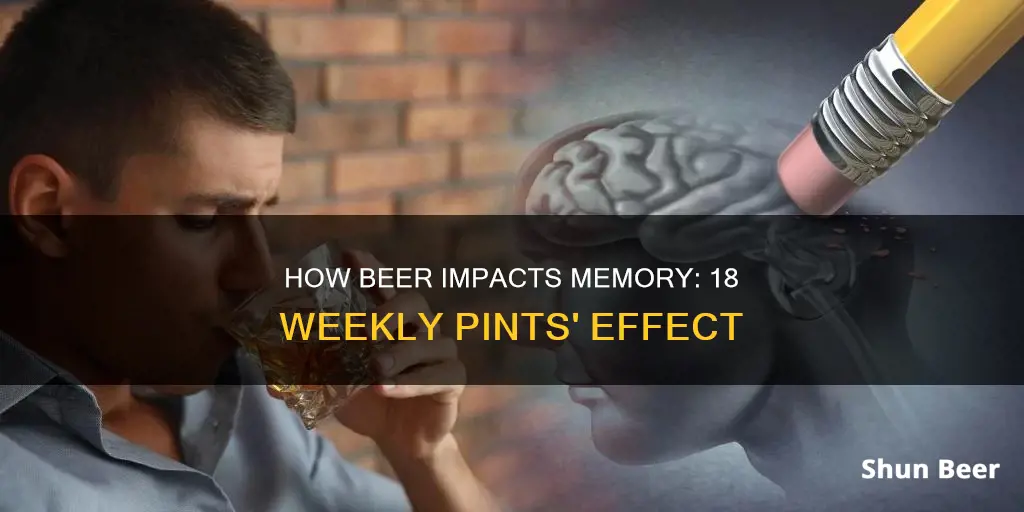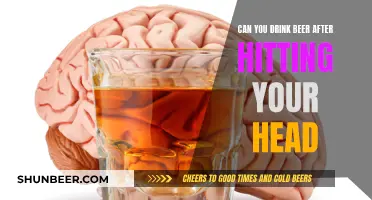
Drinking 18 beers a week is considered heavy drinking and can have detrimental effects on your health, including your memory. Excessive alcohol consumption can lead to short- and long-term memory loss, with studies showing that men who drank heavily experienced signs of cognitive decline earlier than those who didn't. Research has also found that alcohol affects the hippocampus, which is responsible for forming and maintaining memories, and can cause blackouts and short-term memory lapses. Heavy drinking can also lead to vitamin B1 deficiency, which is linked to permanent memory loss or dementia.
| Characteristics | Values |
|---|---|
| Amount of alcohol consumed | 18 beers a week |
| Impact on memory | Potential short- and long-term memory loss |
| Brain regions affected | Hippocampus, cerebral cortex |
| Factors influencing vulnerability | Age, gender, pregnancy, mental health disorders |
| Recommended intake | 1 drink/day for women, 2 drinks/day for men |
| Health risks | Dementia, cardiovascular problems, cancer, etc. |
What You'll Learn
- Heavy drinking can lead to permanent memory loss, described as dementia
- Alcohol affects short-term memory by slowing down nerve communication in the hippocampus
- Long-term memory loss can also occur as heavy alcohol use can damage the hippocampus
- Wernicke-Korsakoff syndrome (WKS) is a type of dementia linked to heavy alcohol use
- Alcohol can increase the risk of chronic diseases, including certain types of cancer

Heavy drinking can lead to permanent memory loss, described as dementia
Alcohol affects short-term memory by slowing down how nerves communicate with each other in the hippocampus, a part of the brain that plays a significant role in helping people form and maintain memories. When normal nerve activity slows down, short-term memory loss can occur.
Heavy alcohol use can also damage the hippocampus and destroy nerve cells, affecting a person's memory in the short and long term. In addition, heavy drinking is linked to vitamin B1 (thiamine) deficiency, which is vital for providing energy to brain and nerve cells. Thiamine deficiency can cause dementia, which is progressive and permanent memory loss.
Wernicke-Korsakoff syndrome (WKS) is a type of dementia linked to heavy alcohol use, creating gaps in a person's memory. According to Massachusetts General Hospital, the effects of long-term memory loss are usually related to drinking 21 or more drinks a week for four or more years.
Research has also shown that the more a person drinks, the greater the toll on their brain. A study by the University of Pennsylvania found that light-to-moderate alcohol consumption was associated with reductions in overall brain volume. The link between drinking and brain volume grew stronger with increased alcohol consumption. For example, in 50-year-olds, going from drinking one unit of alcohol per day to two units per day was associated with changes in the brain equivalent to aging two years.
Calories in Beer vs Mixed Drinks: Which is Worse?
You may want to see also

Alcohol affects short-term memory by slowing down nerve communication in the hippocampus
Drinking 18 beers a week is considered heavy drinking, and it can have adverse effects on your health, including your memory. Alcohol affects the brain in several ways, and one of the key areas impacted is the hippocampus, which plays a crucial role in memory formation and retrieval.
The hippocampus is a part of the brain that is essential for forming and maintaining memories. Alcohol acts as a central nervous system depressant, slowing down nerve communication in the hippocampus, which leads to short-term memory loss. This slowing down of nerve communication disrupts the normal functioning of the hippocampus, impairing its ability to form new memories.
The hippocampus is particularly vulnerable to the effects of alcohol due to its role in memory. When nerve activity in the hippocampus is disrupted, it becomes difficult for the brain to form and store new memories effectively. This results in short-term memory loss, where individuals may struggle to recall recent events or even entire nights.
Additionally, heavy alcohol use can also damage the hippocampus. It can destroy nerve cells, leading to both short-term and long-term memory loss. This damage can be permanent and is associated with dementia.
The effects of alcohol on the hippocampus and memory are dose-dependent, meaning the higher the dose of alcohol, the greater the disruption to nerve communication and memory function. At higher doses, alcohol inhibits neuronal activity in the hippocampus, making it even more difficult to form new memories.
In summary, alcohol affects short-term memory by slowing down nerve communication in the hippocampus, a crucial region for memory formation. Heavy drinking, such as consuming 18 beers a week, can lead to more severe disruptions and damage to the hippocampus, resulting in more significant memory impairments.
Beer and Breastfeeding: Is It Safe to Drink Alcohol?
You may want to see also

Long-term memory loss can also occur as heavy alcohol use can damage the hippocampus
Drinking 18 beers a week is considered heavy drinking. Heavy alcohol use can lead to lapses in memory, including difficulty recalling recent events, entire nights, or even permanent memory loss. Long-term memory loss can also occur as heavy alcohol use can damage the hippocampus.
The hippocampus is a brain structure vital to learning and memory. It is located in the right and left temporal lobes of the brain and is known to be injured by chronic stress and in Alzheimer's disease. The hippocampus plays a significant role in helping people form and maintain memories. When normal nerve activity slows down, short-term memory loss can occur.
Research has shown that heavy drinking can reduce total hippocampus volume, which likely reflects a loss of hippocampal tissue substance. This reduction in hippocampus volume has been observed in adolescent heavy drinkers, with greater volume deficits associated with earlier alcohol use. In addition, studies have found that the hippocampus exhibits enhanced NMDA-mediated neurotoxicity during alcohol withdrawal, leading to excessive neuroexcitation and, ultimately, neuronal damage.
Animal models have also supported the hypothesis that alcohol impairs memory formation by disrupting hippocampal activity and neurogenesis. Rodent studies have shown that adolescent alcohol exposure could increase the relative proportion of immature, more excitatory synapses in the hippocampus, contributing to memory blackouts, excitotoxicity, and other alcohol-induced memory deficits. Furthermore, binge-like alcohol treatment in young rodents decreased neurogenesis, and new cells died, likely due to necrosis.
Overall, heavy alcohol use can damage the hippocampus, leading to long-term memory loss. The specific effects on memory may vary depending on the age of the individual, the amount and pattern of alcohol consumption, and other factors.
Beer and Bowel: Friend or Foe?
You may want to see also

Wernicke-Korsakoff syndrome (WKS) is a type of dementia linked to heavy alcohol use
Drinking 18 beers a week is considered excessive drinking and can lead to several health issues, including problems with memory and learning. While moderate drinking may not significantly impact memory, heavy alcohol consumption is linked to Wernicke-Korsakoff syndrome (WKS), a severe form of alcohol-related brain damage that can result in permanent memory loss.
Wernicke-Korsakoff syndrome (WKS) is a serious condition that often goes undiagnosed, affecting individuals with chronic alcohol misuse and severe alcohol use disorder (AUD). It involves two distinct brain disorders: Wernicke's encephalopathy and Korsakoff's syndrome or psychosis. Wernicke's encephalopathy is the initial stage, characterised by intense inflammation of the brain, disorientation, confusion, mild memory loss, poor balance, and malnutrition. If left untreated or not treated promptly, it can progress to Korsakoff's syndrome, a long-term condition with more severe and permanent symptoms.
The underlying cause of WKS is the combination of brain damage associated with AUD and vitamin B1 (thiamine) deficiency. Alcohol prevents the body from absorbing thiamine properly, which is essential for brain cells to function optimally. This deficiency can have severe and long-lasting effects on the brain, leading to gaps in memory and cognitive impairments.
The symptoms of Korsakoff's syndrome include severe and irreversible memory impairments, including anterograde amnesia, confabulation (filling in memory gaps with fabricated stories), hallucinations, repetitive speech and actions, decision-making difficulties, and lack of motivation. The brain regions affected by WKS include the thalamus, hippocampus, hypothalamus, and cerebellum, which are responsible for various functions such as vision, movement, language, sleep, memory, and motivation.
The treatment for WKS involves immediate abstinence from alcohol and high doses of thiamine supplementation, either intravenously or orally. Proper nutrition, hydration, and other medications are also crucial for managing specific symptoms. Memory rehabilitation therapies similar to those used for dementia may be beneficial in reducing the impact of WKS symptoms. However, severe cases often require residential care.
Beer and Basketball: A Match Made in Heaven?
You may want to see also

Alcohol can increase the risk of chronic diseases, including certain types of cancer
Drinking 18 beers a week is considered excessive drinking and can have several adverse effects on your health, including memory problems. Binge drinking is defined as consuming five or more drinks within two hours for men and four or more drinks within two hours for women. Excessive drinking can lead to memory issues, such as difficulty recalling recent events or even entire nights, and can also result in permanent memory loss or dementia. Alcohol affects short-term memory by slowing down nerve communication in the hippocampus, a part of the brain responsible for forming and maintaining memories. Long-term memory can also be impacted as heavy alcohol use can damage the hippocampus and destroy nerve cells.
Furthermore, alcohol increases the risk of chronic diseases, including certain types of cancer. According to research, excessive drinking is linked to at least 60 different medical conditions, both short-term and long-term. While moderate drinking may offer some health benefits, such as a reduced risk of heart disease or Alzheimer's, heavy drinking reverses these benefits and increases the risk of chronic illnesses. Alcohol misuse is a leading cause of disability and premature death worldwide, and it is associated with a shorter lifespan.
The effects of alcohol on the brain are well-documented in various studies. Research using data from over 36,000 adults found that even light-to-moderate alcohol consumption was associated with reductions in overall brain volume. The link between brain volume and alcohol consumption was stronger with higher consumption levels. Additionally, heavy drinking has been linked to alterations in brain structure and size, resulting in cognitive impairments.
The negative consequences of excessive drinking extend beyond health issues. It can also lead to problems in personal and professional life, including decreased productivity at work, job loss, financial difficulties, and strained relationships with friends and family. Recognizing the signs of excessive drinking and seeking help when needed are crucial to mitigate the potential harm to both health and well-being.
Beer Butt Chicken: Does It Work?
You may want to see also







